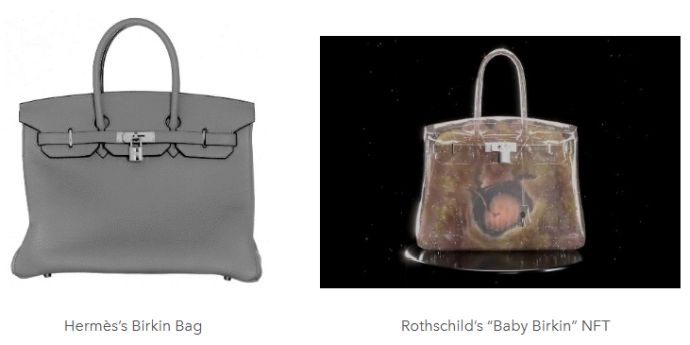Jury Decision
After being inspired by actress Jane Birkin on an Air France flight, Hermès chief executive Jean-Louis Dumas designed the Birkin handbag in 1984. Since then, Hermès posits that the Birkin has surpassed "it bag" status and become the epitome of luxury and exclusivity. In December 2021, artist Mason Rothschild began selling non-fungible tokens ("NFTs") displaying Birkin bags along with the designation METABIRKINS. In response, Hermès sued Rothschild in the United States District Court for the Southern District of New York ("S.D.N.Y.") for trademark infringement, among other causes of action.

After the court denied the parties' dispositive motions, the case proceeded before a jury which sided entirely with Hermès on February 8, 2023. Rejecting Rothschild's First Amendment and non-infringement defenses, the jury found Rothschild liable for trademark infringement, trademark dilution, and cybersquatting and awarded Hermès $133,000 total in damages.
Case Background
On January 14, 2022, Hermès filed its complaint alleging that Rothschild's unauthorized creation and sale of METABIRKINS NFTs – first at Art Basel, Miami and later through marketplaces like OpenSea, Rarible, LooksRare, and Zora – constitutes infringement of Hermès' BIRKIN trademark and trade dress in the Birkin bag. Per Hermès' complaint, "replicating the physical world success of the BIRKIN bag in the 'metaverse' through pervasive use of the mark METABIRKINS to brand all of his 'metaverse' business activities," Rothschild wrongly trades on the value and fame of the BIRKIN mark and trade dress.
Rothschild responded by filing a motion to dismiss. In sum, Rothschild argued that "Hermès asks this Court to suppress Rothschild's art and to restrain his protected speech in the service of protecting Hermès' commercial interest in its trademarks." In an attempt at contextualizing the allegedly infringing NFTs, the motion states that "Rothschild's MetaBirkins art comments on the animal cruelty inherent in Hermès' manufacture of its ultra-expensive leather handbags." These arguments set the stage for Rothschild's request that the court apply the Rogers v. Grimaldi test, under which an artistic work can infringe a trademark if it is devoid of artistic significance or misleading about the work's source. 875 F.2d 994, 999 (2d Cir. 1989).
Hermès, in turn, amended its complaint, bolstering its claims that Rothschild's use of METABIRKINS confuses consumers as to the source and/or nature of the digital works and dilutes Hermès's famous BIRKIN brand. Hermès also asserted that although it has yet to mint and sell its own NFTs, confusion is particularly likely as brands, including ones in the luxury fashion space, begin experimenting with NFTs. According to Hermès, consumers "would expect that NFTs featuring famous brands are affiliated with those brands, or wonder why the famous brands are permitting such dilutive use of their valuable assets and think less highly of them."
Rothschild again moved to dismiss, reiterating many of its prior arguments. Although the court denied the motion on May 18, 2022, holding that the factual determination of whether Rothschild's use of the BIRKIN mark is misleading as to the source or content of the work must be decided by a jury, it held that the Rogers test applies to at least the trademark infringement analysis.
The case proceeded through discovery, after which the parties cross-moved for summary judgment. On December 30, 2022, the court issued an order denying summary judgment and scheduling the jury trial to commence on January 30, 2023.
Amidst the jury trial, on February 2, 2023, the court issued its written opinion on its denial of the parties' cross-motions for summary judgment. In discussing the issue of whether the case "should be evaluated under the Rogers v. Grimaldi test for artistic works or the Gruner + Jahr test for general trademark infringement," the court reaffirmed its prior holding, confirming Rogers as appropriate. The court held, "the Rogers test for creative works applies because the digital images associated with the MetaBirkins NFTs 'could constitute a form of artistic expression.'"
The court's agreement with Rothschild that the Rodgers test applies was a narrow victory for the defendant. After finding for Hermès on all claims, when asked whether the First Amendment nevertheless bars liability, the jury found that it did not.
Future Considerations
This high-profile litigation underscores the evolving interplay between the metaverse and physical world, especially for the fashion industry and luxury brands. As Hermès asserted in its amended complaint, "NFTs can link to digital media like virtual fashion items that can be worn in virtual worlds online." Citing to a New York Times article, Hermès also noted the growing number of "digital-only fashion brands" and "ready-to-wear brands testing out virtual versions of their collections" to be made available to consumers building their digital wardrobe.
While many were eager to learn how a jury would evaluate these issues, it is not the only litigation to highlight the uncertain interconnectivity between NFTs and physical products. In another case currently pending before the S.D.N.Y., Nike sued StockX, an e-commerce resale platform, for trademark infringement based on StockX's minting of NFTs using Nike's trademark without authorization. Nike Inc. v. StockX LLC, 1:22-cv-00983-VEC (S.D.N.Y. 2022). That case has developed to also include counterfeiting claims related to StockX's physical products.
Some of the fundamental legal issues at play in Hermès v. Rothschild case will soon reach the Supreme Court through appeals from the Ninth and Second Circuits. With respect to trademark issues, the Supreme Court is set to hear a version of the First Amendment argument central to Rothschild's defense when it considers whether an allegedly humorous use of another's mark on a commercial product – a "Bad Spaniels" dog toy incorporating an image of a Jack Daniels whisky bottle –should be assessed under the Rogers test. Jack Daniel's Properties, Inc. v. VIP Prod. LLC, 143 S. Ct. 476 (2022). The Supreme Court will also hear an appeal regarding whether Andy Warhol's use of Lynn Goldsmith's photograph of the musician Prince constitutes copyright infringement or is entitled to the fair use defense. Andy Warhol Found. for Visual Arts, Inc. v. Goldsmith, 212 L. Ed. 2d 402, 142 S. Ct. 1412 (2022). If Rothschild appeals to the Second Circuit, as he has said he intends to do, any outcome will likely be influenced by the Supreme Court's rulings in these two cases.
The case is Hermès International, et al. v. Mason Rothschild, 1:22-cv-00384 (S.D.N.Y. 2023).
*Rosie Norwood-Kelly and Maxime Jarquin assisted with the preparation of this article.
The content of this article is intended to provide a general guide to the subject matter. Specialist advice should be sought about your specific circumstances.
We operate a free-to-view policy, asking only that you register in order to read all of our content. Please login or register to view the rest of this article.

